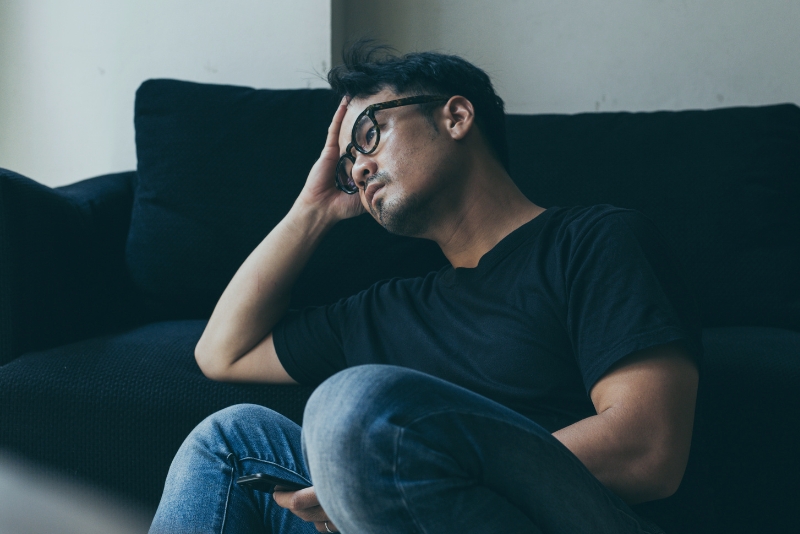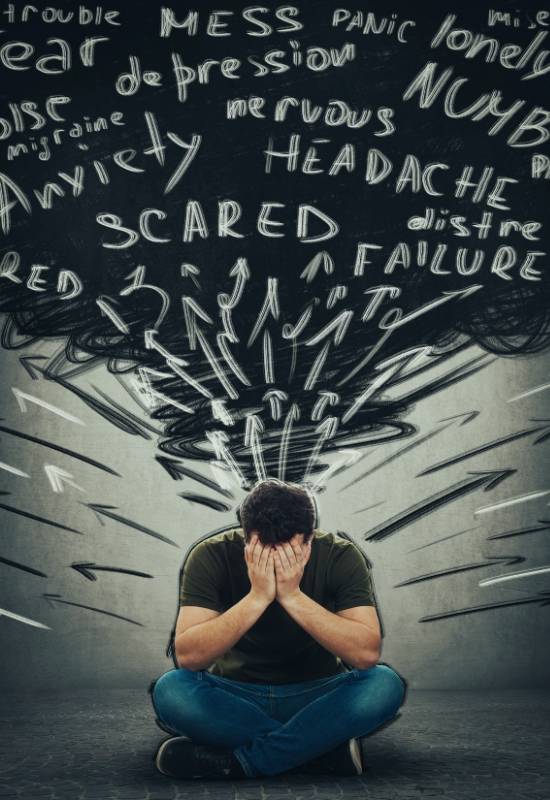Anxiety Counselling
“I believe that there is something important happening inside of us when we experience anxiety and depression, whether that is from past traumas, unresolved issues, or something that is currently happening in our life that requires change either internally or externally. I believe in counselling you can experience some relief from anxiety and depression. This can help shine a light on what is going on at a deeper level, and at that point there is space to do the work to make lasting changes that support you in feeling better/happier/peaceful.” – Laura Bradley
As anyone who has experienced anxiety knows, anxiety is real. It’s painful. It’s scary. It can be debilitating and all consuming.
Anxiety can be very subtle, so that, at first, we aren’t even aware it is there. It creeps up on us. Anxiety can also be very obvious, with strong (sometimes debilitating) symptoms, like an increased heart rate, breathlessness, tightness in the chest, anxious thoughts or all of the above.
Everyone experiences some anxiety – in fact, it can be healthy. Our bodies are wired to respond with a fight/flight/freeze response to perceived danger. This is a healthy and natural response. However, sometimes our body’s wiring misfires when there is no danger. This can happen for many reasons. Some examples are: when a situation feels similar to a time when we were in danger (physical, emotional, psychological), when there is past trauma, unprocessed feelings, a lack of self care over a long period of time, or feeling untethered in too many areas of your life.

What is anxiety?
Anxiety is defined by many as a state of excessive uneasiness and apprehension. It’s an uncomfortable feeling and to a greater or lesser extent, when allowed, will interfere with various aspects of our lives.
Anxiety leads to fear, worry, and a sense of being out of control. It is natural to avoid discomfort and struggle. At first it makes sense to avoid what we think is causing the anxiety. In the long run this can interfere with relationships, experiences at school or work, social connections and full participation in life.
When can anxiety occur?
Anxiety can show up for so many reasons. For example, when we’ve
- Taken on too much responsibility,
- Considered everyone else and not considered our own selves,
- Been running on fumes for too long and not recharging,
- Been tough on ourselves to perform well, please others, or caretake others and not disappoint,
- Headed down a path that is not really where we should be and it feels out of alignment with who we really are,
- Have unresolved issues from the past, or
- Have unexpressed emotions.
Anxiety can also show up for reasons that are so deep, we can’t easily see the source.
When the fear of what might happen begins to dictate how we feel in the present moment, that is a good time to stop and address the anxiety the fear is creating. For example, to hold a belief or fear that something terrible will happen if you make a mistake can absolutely paralyze (freeze) you. Paralysis can mean that it feels almost impossible to make decisions, take actions, or move forward in a positive, productive way.


How can someone tell if they are suffering from anxiety?
Signs that anxiety is affecting you may include:
- restlessness / difficulty concentrating / trouble making decisions,
- a general sense that life is not ok or something is wrong,
- irrational thinking / fears,
- experiencing a lot of worry / worrying about anxiety,
- fixated on the outcome of events,
- avoiding talking to people / avoiding social events,
- feeling overwhelmed by the thoughts running through your head,
- feeling completely alone in the world,
- disruptive sleep / insomnia,
- stressing about what people might think of you,
- a general feeling of being “revved up” and not being able to relax, or
- constant worry that you are doing everything wrong, and everyone is going to find out.
More severe anxiety may feel like:
- anxiety attacks / panic attacks,
- tightness in the chest, heart palpitations,
- difficulty breathing,
- chronic indigestion, or
- racing thoughts.
“It takes courage to endure the sharp pains of self-discovery rather than choose to take the full pain of unconsciousness that would last the rest of our lives.”
Marianne Williamson
What is the counselor’s role?

Counselling helps with anxiety because it provides a place for you to gently explore your anxiety with support.
In counselling, you can build awareness of your anxiety and experience it with the counsellor’s support. You’ll find new ways to move through the anxiety, understand the cause of it, and develop tools for dealing with it differently.
Counselling can help by simply giving you the space to share about what you are anxious about. A skilled counsellor can also help direct you to its root cause and to give you tools to help you cope with it.
Also, one of the biggest benefits of counselling is that it will help to normalize your experience with anxiety. There is no shame in struggling with anxiety, we live in an extremely fast-paced world which in and of itself can be overwhelming and create a lot of anxiety. Getting support is key.
Just as we are wired to have anxiety, we are also wired for connection.
Connecting with a therapist who understands the root causes of anxiety is helpful, because they can hold you in a compassionate space until you can learn to do so for yourself.
Your counsellor will help you identify where you’re getting stuck, where you’re falling into patterns and where your thought cycles are imposing limitations in your life. Counsellors also provide you with tools and resources to help you set goals and achieve success.
Self-compassion can be a good anti-dote for anxiety. It’s true that confiding in friends can be supportive, but friends can also collude with our anxiety unknowingly. A therapist will be able to see beyond your stories and get to the source of the emotional trigger, which is something they are trained and skilled at doing.
In our counsellors’ words
“Pushing aside the difficult feelings associated with anxiety and depression is usually what created the anxiety and depression. Continuing to dismiss or suppress these feelings may give us the sense that we can manage, but my experience is that it creates feelings of overwhelm–much like a pressure cooker. And like with a pressure cooker, letting some of those feelings out leaves us feeling relief from the overwhelm, pressure, impatience, etc.
Learning skills to feel your feelings in a way that feels safe will help you to experience them as they come up, just as we were intended to do. We restore our nervous system’s natural way of functioning so we can experience greater vitality, self-acceptance and peace.” – Melanie Behrner
“I have struggled with anxiety and depression in my own life, so I have learned a lot about how to care for myself there. Acknowledging the presence of those feelings and living a healthy lifestyle have been key for me. The negative self-talk, that can intensify anxiety or depression, has much less power over me now due to these changes I have made. Allowing rather than resisting feelings, I have found, has the opposite effect than what our dysregulated brains would have us think. It is safe to feel and all experiences come and then they go.” – Ashar Neufeld
“If anxiety interferes with your daily life – whatever that might look like to you – that’s reason enough to seek counselling.
If you do not address anxiety now, it will continue to pop its head up, each time getting harder to deal with, feeling a bit more crippling, and taking time away from the life you most want, and deserve, to be living. Over time anxiety can become your natural state, and potentially lead the to disease and chronic ailments.
I can’t overstate that it’s worth it to be courageous, seek the support of a counsellor and address your anxiety. You deserve to live your life with the freedom and peace that comes when you are able to be more present in life and better able to trust in your decisions.” – Patrick McGill
“Regarding anxiety, I like to remind my clients about two things. Anxiety is normal. It is the body’s response to stress. It means we care about our lives and yet, too much anxiety is overwhelming and exhausting. You are not your anxiety. One of the biggest ways to support ourselves is to begin to see it as something that is separate from us. We can be experiencing anxiety, but it is not us and it is not necessarily fully in control.
One of the main ways I work with people who have anxiety is in the area of changing our relationship to it. It can feel like it is all powerful and that we have no control, but is that true?
It can be helpful to view anxiety as a scared animal or upset child — separate from ourselves, and meet it with curiosity, rather than fear.
This is very difficult to do when we are in its grip. But it is something we can do with support, and knowing that we are ok and safe.” – Nate Torhjelm





